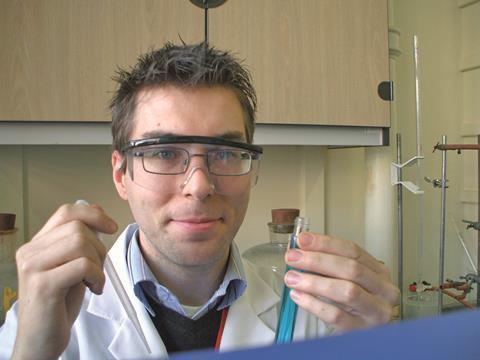Chris has spent the past 18 months working as the senior science technician at Gateway College. He talks to Rachel Bolton-King about his typical day

Gateway College is based in Leicester city centre and has ca 1500 students, most of who are 16–18-year olds. There are five faculties and Chris works within the science and mathematics department where he is the senior of two technicians. He is the technician for chemistry and physics courses, including GCSE, BTec and A-Level, and also supports the biology-based technician.
Practical-based learning
Chris’ work follows a weekly cycle. Every Thursday he meets with staff teaching courses in chemistry, physics and sometimes biology for an hour. They discuss the curriculum specifications and targets for the forthcoming week and decide on practicals that will illustrate and enhance students’ understanding of the topics to be covered. The title of each experiment is written on a white board in its relevant lesson period. Using this timetable, Chris plans and organises the equipment required for each lesson in advance.
On Fridays, Chris puts the chemicals and apparatus required for each practical into separate labelled trays. On Mondays, he tests the apparatus and chemicals to ensure all experiments work correctly. This can take him two–three hours and he makes changes if there are problems, for example he might have to re-make contaminated solutions. Chris also demonstrates and explains unfamiliar practicals to teachers to ensure they can do the experiments competently.
Prior to a practical lesson, Chris sets up any demonstrations required. He then arranges equipment around the laboratory, leaving the students to learn how to set up their apparatus. Some students arrive at the college with little lab experience so to improve their practical skills the faculty runs science courses that involve more experiments than suggested in the curriculum. Chris uses his scientific training to devise practicals to explain complex topics, such as reversible reactions. He uses resources, such as the Royal Society of Chemistry (RSC) website and RSC publications, to help design experiments.
The students’ lack of practical experience requires Chris to be present in up to 60 per cent of lessons to provide extra support for the students and principal teacher, and to minimise risk associated with using hazardous materials, such as handling concentrated acids. By helping in the classroom Chris can provide teachers with valuable information on students’ progress as well as highlight instances where students may require further support.
After each lesson, Chris takes the apparatus to his prep room and washes dirty glassware, first by hand and then in a specialist dish-washer. He then either resets the tray for another group or puts the equipment away carefully. Chris also manages the faculty’s budget for reagents and glassware, and orders new stock as required.
Other than lab-based work, Chris plans and organises visits to local science sites, such as Leicester University and AstraZeneca. He accompanies the students on these visits, which are designed to enhance students’ understanding of science and show industrial applications of specific techniques, eg mass spectrometry.
Insight into teaching
Chris applied to be a technician to build on his scientific experience, gain insight into secondary science education and explore his career prospects in teaching. He aims to start a teacher training course in a couple of years.
Pathway to success
2007–present, senior science technician, Gateway Sixth Form College, Leicester
2006–07, gap year travelling across Europe
2003–06, BSc biomedical science with accreditation (2.i), De Montfort University
1999–2003, biology, chemistry, psychology A-levels and GNVQ double advanced health and social care, Longslade Community College, Leicester
PhD student, Rachel Bolton-King was given a grant by Chemistry: the next generation (C:TNG) to write this article in collaboration with Education in Chemistry.
This article was originally published in InfoChem







2 readers' comments